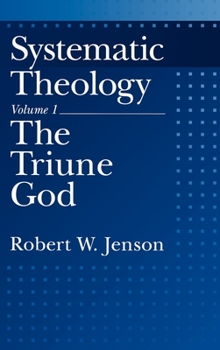Book Overview
The Triune God, together with the forthcoming second volume, The Works of God, develops a compendious statement of Christian theology in the tradition of a medieval summa, or of such modern works as those of Schleiermacher and Barth. Theology, as it is understood here, is the Christian church's continuing discourse concerning her specific communal purpose; it is the hermeneutic and critical reflection internal to the church's task of speaking the...
Format:Hardcover
Language:English
ISBN:0195086481
ISBN13:9780195086485
Release Date:August 1997
Publisher:Oxford University Press
Length:256 Pages
Weight:1.24 lbs.
Dimensions:0.9" x 6.2" x 9.5"
Customer Reviews
2 ratings
A Stimulating Read
Published by Thriftbooks.com User , 18 years ago
This is absolutely one of the best systematic theologies out there. Like Halden mentions below, this book (both volumes in fact) are useful in concert with Colin Gunton and Wolfhart Pannenberg, and to various extents Kevin Vanhoozer, especially in his notions of the dramatis personae of God's activity with us in history, His "dramatic coherence," (and in this respect, would be a good read alongside von Balthazar) Jenson begins his prolegomena by outlining what he sees as a deficiency in traditional prolegomenal issues that see Christian thought as an inherently problematic enterprise that must be validated antecedently by "more secure" foundations (e.g. the processes of neo-protestantism bred by Schliermachers defintion of religion as a feeling of absolute dependece, or the so called "greek proof," where much of Christian thinking has been based on supposedly rational inquiry of the Greek period, which Jenson notes, is no more universal than the historically situated expressions in the Bible.) Rather, with Pannenberg, Plantinga, and others (even Heidegger!), Jenson understands that if true, the Bible knows God, the one basic "fact" of all reality, and so theology must be either a foundational discipline or an illusion. That said, the entire program of this book is based on overcoming basic theological notions that seem to have been held out from Greek antiquity, especially static unterstandings of God's immutability and eternity. Rather, Jenson's emphasis is on an active and living God (thought one should not misread Jenson as a panentheist or process philosopher) Other examples include Jenson's reorientation of our notions of infinity. Much like Pannenbergs adoption of the Hegelian postulation for the "true infinite," Jenson shies away from traditional understandings (based on a large part on the aristotelian and platonic leanings of Thomist and post-Thomist scholasticism) of God's infinity as lacking all boundaries. Rather, along with Gregory of Nyssa (and Duns Scotus, among others) God is infinite not because He lacks boundaries, but because He overcomes all boundaries. This leads the way for Jenson's concept of eternity as an embrace of time, in such a way that we are led from a strictly linear conception (such as Aristotle's conception of eternity as an endless line stretching past and future) or as a static timelessness (like Plato and Aristotle's eternity proper, adopted in large part by Augustine) Rather, God is eternal because He is unbounded by past events, nor is He limited by future occurance, rather He (specifically the Holy Spirit) is the Future in that He unrestrictedly anticipates His ends and means. In this sense we see that Eternity is a derivative of Jenson's concept of infinity. He is unboundedly lively, "A Temporal Infinity," no temporal metric may keep pace with Him. Jenson also formulates his notion in such a way that the embrace of time makes God's events in time their own presupposition in God's eternity, so
America's Finest Theologian
Published by Thriftbooks.com User , 21 years ago
At a lecture in Chicago, Wolfhart Pannenberg pointed to a man in the audience and announced that the gentleman was the finest systematic theologian in the United States. That man was Robert W. Jenson. Jenson is not an easy theologian to read. His writing style is unique. His erudition overwhelming. His commitment to a catholic presentation of the Christian faith is emphatic; but he is also creative and original. What is perhaps most refreshing about Jenson is his refusal to surrender to the ideologies and fashions of the day. I have been reading Jenson's works for the past twenty years, and he remains one of the most intellectually exciting theologians that I know. If you want to understand Jenson, you must understand that that he truly believes that Jesus of Nazareth is the Second Person of the Holy Trinity, that the historical man Jesus is constitutive for the identity of God. Few will agree with Jenson at all points; but all will be creatively challenged by him. Jenson is sometimes compared to Moltmann. Moltmann is of course far more popular; but he cannot hold a candle to Jenson's erudition, originality, and creativity. Jenson is profitably read in conversation with the systematic theology of Wolfhart Pannenberg.





